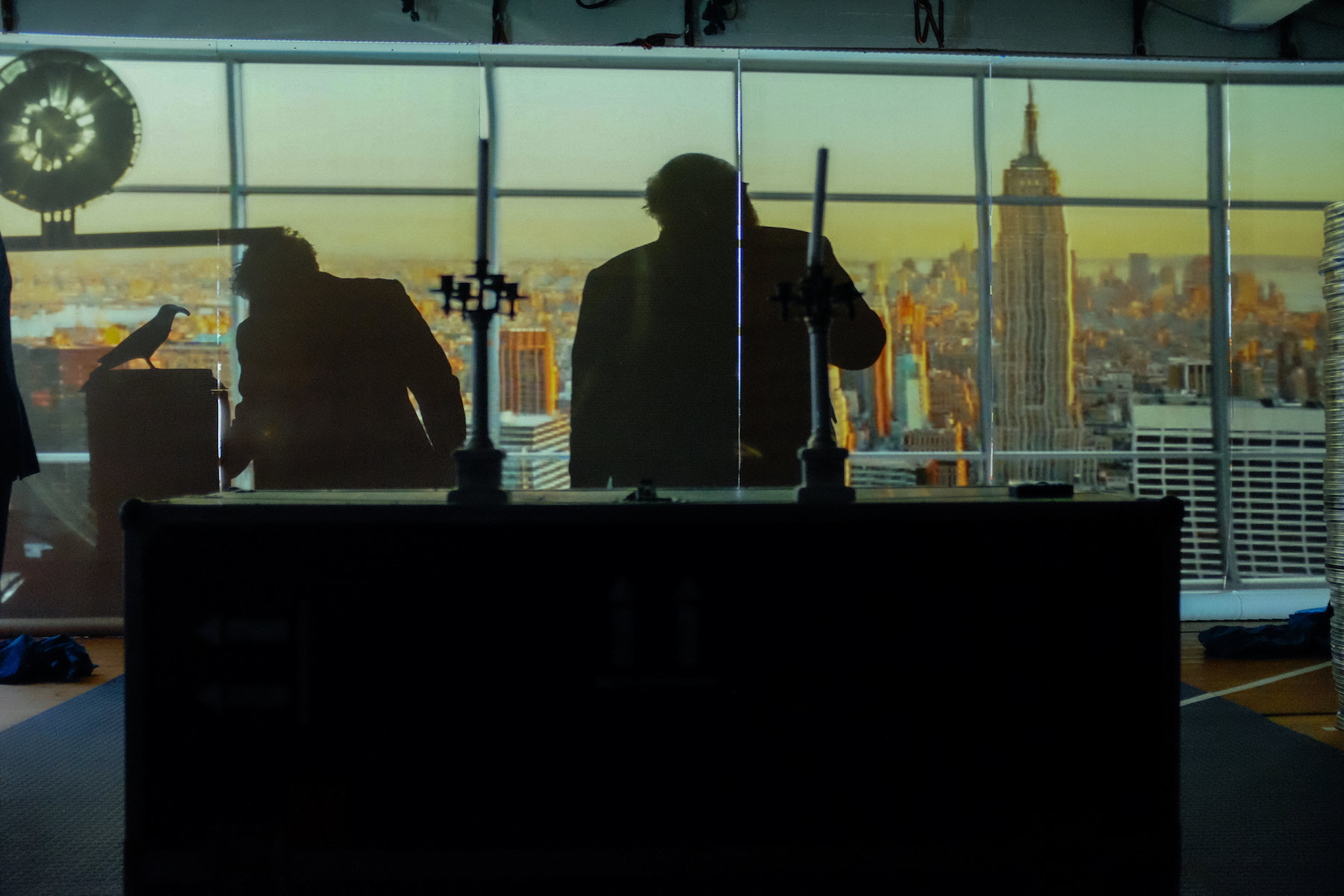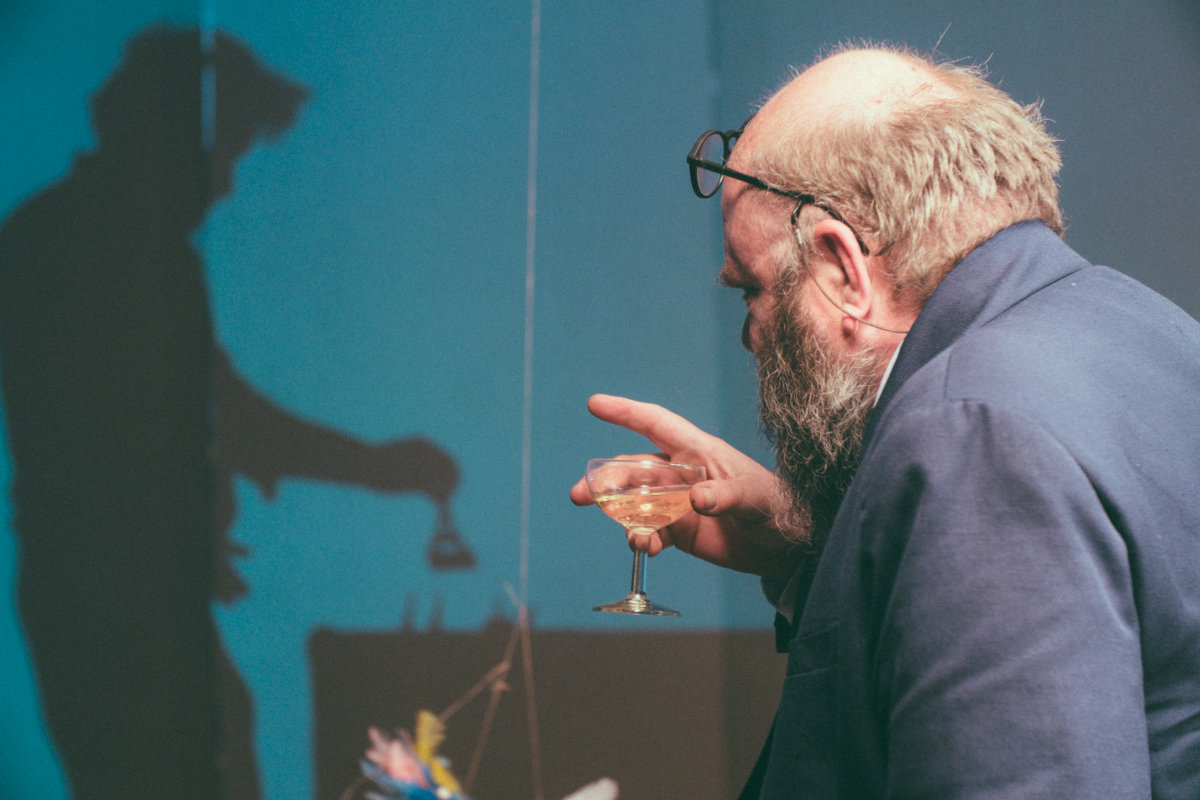Que sera sera / Hitchcock Truffaut Cavett Godard / Pour qui pour quoi tg STAN
1h45, Niederländisch mit deutschen Übertiteln
VON Bert Haelvoet, Damiaan De Schrijver und Matthias de Koning
MIT Bert Haelvoet und Damiaan De Schrijver
TEXTE AUS: Mr. Hitchcock, wie haben Sie das gemacht? von François Truffaut (c) Editions Gallimard
ÜBERSETZUNG: Andrea Kluitmann
VIDEO: Emma Hampsten
KOSTÜME: Elisabeth Michiels
TECHNIK: Tim Wouters
PRODUCTION: tg STAN
- English
- Français
- Deutsch
In April 1962 François Truffaut wrote a letter to Alfred Hitchcock:
“Dear Mr. Hitchcock,
In the course of my discussions with foreign journalists, I have come to realize that people’s conception of your work is often very superficial. Moreover, the kind of propaganda we were responsible for in ‘Cahiers du Cinéma’ (Notebooks on Cinema) was excellent as far as France was concerned, but inappropriate for America because it was too intellectual. Since I have become a director myself, my admiration for you has in no way diminished; on the contrary, it has grown stronger and changed. I have watched all your films five or six times, increasingly from the standpoint of the production process. There are many directors with a love for the cinema, but what you possess is a love of celluloid itself and it is that which I would like to talk to you about. I would like you to grant me a tape-recorded interview which would take about eight days to conduct and would add up to about thirty hours of recordings. The point of this would be to distil not a series of articles but an entire book, which would be published simultaneously in New York and Paris, then, probably later, more or less everywhere in the world."
In Los Angeles Alfred Hitchcock was directing his 48th film, The Birds. He wired Truffaut to say that the interview could go ahead, beginning on August 13th 1962, his birthday.
Hitchcock agreed to spend a week during the final edit of The Birds answering 500 questions spanning his entire career. Truffaut quizzed Hitchcock film by film, in much the same way as Oedipus consulted the Oracle of Delphi.
Four years later, around the end of 1966, the book LE CINEMA SELON ALFRED HITCHCOCK/CINEMA ACCORDING TO HITCHCOCK was finally ready. Truffaut had occasionally interviewed Hitchcock during those four years to ensure that his book would be up to date.
Partly as a result of the book, in 1968 American film critics began looking at Hitchcock’s work differently and taking it more seriously.
In 1983, a year before his death, Truffaut introduced the final corrections and the definitive version appeared.
Around the year 2000, for the first time the Belgian film director Guido Henderickx (Moeder, waarom leven wij?, Verbrande brug, Proefkonijnen, Koning van de wereld) told his friend, actor Damiaan De Schrijver, why he and many other film enthusiasts all over the world regarded the book as his film bible. The seed was sown.
In the documentary Hitchcock/Truffaut which appeared in 2015, film directors underline the importance of the book and of Hitchcock’s work.
In 2019 De Koning, De Schrijver and Haelvoet set about turning this iconic reference work into a stage play.
It all began with the broken ice. Truffaud was still a film critic when in the winter of 1955 Hitchcock granted him his first interview for ‘Cahiers du Cinema’. Just before that, Truffaut, nervous about meeting his idol, fell through the ice on a frozen pond. An unruffled Hitchcock suggested that they postpone the interview. Years later Hitchcock had this to say about it: “Every time I drink a whisky on the rocks, I think of you.”
Pour ce nouveau spectacle, Damiaan De Schrijver, Bert Haelvoet et Matthias de Koning s’aventurent sur le terrain du cinéma. Où se rencontrent le théâtre et le cinéma ? Où s’affrontent-ils et où se consolident-ils ? Une multitude de matériaux sources – comme l’interview qu’Alfred Hitchcock a accordée, entre autres, à François Truffaut et à Jean-Luc Godard – forme leur point de départ.
Chronologie
En 1962, François Truffaut passe une semaine à interviewer Alfred Hitchcock.
En 1966, l’ouvrage Le Cinéma selon Alfred Hitchcock paraît enfin.
En 1983, un an avant sa mort, Truffaut publie la version définitive.
En 2000, le cinéaste belge Guido Henderickx raconte une première fois à Damiaan De Schrijver pourquoi il considère cet ouvrage comme sa bible du cinéma. La graine est plantée.
En 2015, le documentaire Hitchcock/Truffaut sort. Nombreux cinéastes y soulignent l’importance de l’ouvrage et l'influence de l’œuvre de Hitchcock.
En 2019, Damiaan De Schrijver, Bert Haelvoet et Matthias de Koning tentent de distiller un spectacle de théâtre à partir de cet ouvrage de référence.
Tout commence par la glace brisée. Au cours de l’hiver 1955, Truffaut – encore en sa qualité de critique de cinéma – peut interviewer Hitchcock une première fois pour la revue Cahiers du cinéma. Peu de temps avant, le cinéphile Truffaut, très nerveux à l’idée de rencontrer son idole, tombe dans un petit étang gelé dont la glace se brise. Des années plus tard, Hitchcock dit à ce propos :
« Chaque fois que je me sers un whisky avec des glaçons, je pense à vous. »
In ihrem Theater-Stück amüsieren sich Schauspieler des belgischen Theaterkollektivs Tg Stan in einem wilden Reenactment des berühmten Hitchcock - Truffaut - Treffens. Was passiert, wenn Theater und Film aufeinanderstoßen?
Im April 1962 schrieb François Truffaut einen Brief an Alfred Hitchcock.
“Dear Mr. Hitchcock,
In the course of my discussions with foreign journalists, I have come to realize that people’s conception of your work is often very superficial. Moreover, the kind of propaganda we were responsible for in ‘Cahiers du Cinéma’ (Notebooks on Cinema) was excellent as far as France was concerned, but inappropriate for America because it was too intellectual. Since I have become a director myself, my admiration for you has in no way diminished; on the contrary, it has grown stronger and changed. I have watched all your films five or six times, increasingly from the standpoint of the production process. There are many directors with a love for the cinema, but what you possess is a love of celluloid itself and it is that which I would like to talk to you about. I would like you to grant me a tape-recorded interview which would take about eight days to conduct and would add up to about thirty hours of recordings. The point of this would be to distil not a series of articles but an entire book, which would be published simultaneously in New York and Paris, then, probably later, more or less everywhere in the world.”
In Los Angeles drehte Alfred Hitchcock gerade seinen 48. FilmThe Birds. Er akzeptierte gleich die Interviewanfrage und beantwortete 500 Fragen über seine gesamte Karriere. Truffaut befragte Hitchcock nach jedem seiner Filme, so wie auch Oedipus das Orakel von Delphi konsultierte.
Ende 1966 wurde das Buch Le cinéma selon Alfred Hitchcock (Erst 1973 auf deutsch: Mr. Hitchcock, wie haben Sie das gemacht?) finalisiert. Es hatte zur Folge, dass ab 1968 die amerikanische Kritik das Werk von Hitchcock anders zu betrachten begann, ernster nahm.
Auch in dem Dokumentarfilm Hitchcock/Truffaut (2015) gaben diverse RegisseurInnen an, dass dieses Buch und allgemein die Werke von Alfred Hitchcock einen großen Einfluss auf ihre Arbeit hatten.
Matthias De Koning, Damiaan De Schrijver und Bert Haelvoet inszenierten 2019 diese ikonische Referenzwerk für die Bühne.
Alles begann mit gebrochenem Eis: Truffaut war noch Filmkritiker für Les Cahiers du Cinéma, als ihm Alfred Hitchcock im Winter 1955 zum ersten Mal ein Interview für eben diese Zeitschrift zusagte. Kurz zuvor brach Truffaut, nervös sein Idol zu treffen, durch das Eis eines zugefrorenen Teiches. Der ruhige Hitchcock schlug vor, das Interview zu verschieben. Ein paar Jahre später teilte Alfred Hitchcock François Truffaut mit: “Every time I drink a whisky on the rocks, I think of you.”
Österreichische Premiere
The text of this play was translated with the support of Flanders Literature (flandersliterature.be).
Pressespiegel
-
"In Que Sera Sera nehmen uns die Schauspieler mit in ein wirbelndes, zuweilen brillantes Spiel, in dem Film-Fiktion und Theater-Wirklichkeit zusammenschmelzen.”
-
“Que Sera Sera ist durchsiebt mit einer wunderbaren Stümperhaftigkeit.”
-
“Wir haben uns zu Tränen mit dem urkomischen Que sera sera von Tg Stan gelacht.”
-
"Es ist die ungeschliffene Aufrichtigkeit, die die Arbeit von tg STAN, auch in ihrer Ode an Hitchcock und Truffaut, nach dreißig Jahren immer noch so kraftvoll macht."
-
“Die älteren Filmfans werden völlig zufriedengestellt. Es ist eine Freude in so viele beliebte Filme zurückversetzt zu werden. Ein jüngeres Publikum wird daher anders mit dem Material umgehen und vor allem eine Komödie sehen. Es ist deutlich eine Aufführung, die sich an verschiedene Generationen wendet.”




